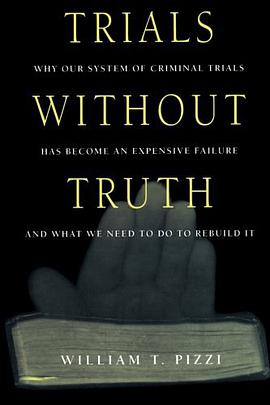

具体描述
Rodney King. Reginald Denny. O. J. Simpson. Colin Ferguson. Louise Woodward: all names that have cast a spotlight on the deficiencies of the American system of criminal justice. Yet, in the wake of each trial that exposes shocking behavior by trial participants or results in counterintuitive rulings--often with perverse results--the American public is reassured by the trial bar that the case is not "typical" and that our trial system remains the best in the world. William T. Pizzi here argues that what the public perceives is in fact exactly what the United States has: a trial system that places far too much emphasis on winning and not nearly enough on truth, one in which the abilities of a lawyer or the composition of a jury may be far more important to the outcome of a case than any evidence. How has a system on which Americans have lavished enormous amounts of energy, time, and money been allowed to degenerate into one so profoundly flawed? Acting as an informal tour guide, and bringing to bear his experiences as both insider and outsider, prosecutor and academic, Pizzi here exposes the structural faultlines of our trial system and its paralyzing obsession with procedure, specifically the ways in which lawyers are permitted to dominate trials, the system's preference for weak judges, and the absurdities of plea bargaining. By comparing and contrasting the U.S. system with that of a host of other countries, Trials Without Truth provides a clear-headed, wide-ranging critique of what ails the criminal justice system--and a prescription for how it can be fixed.
作者简介
目录信息
读后感
评分
评分
评分
评分
用户评价
相关图书
本站所有内容均为互联网搜索引擎提供的公开搜索信息,本站不存储任何数据与内容,任何内容与数据均与本站无关,如有需要请联系相关搜索引擎包括但不限于百度,google,bing,sogou 等
© 2026 book.wenda123.org All Rights Reserved. 图书目录大全 版权所有




















